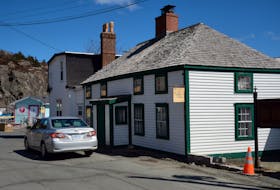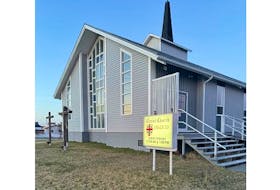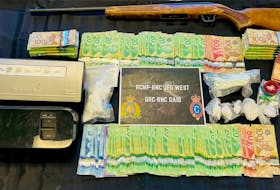Recently a large amount of moose, 50 in total, was sent to community freezers in Hopedale, Nain and other Nunatsiavut communities. Upon receipt of the moose meat, they started handing it out to residents and within a few days started getting complaints that it smelled kind of strange.
The Nunatsiavut government looked into the meat and found out that some of it appeared to be spoiled.
Darrell Shiwak, Natural Resources and Lands minister for the Nunatsiavut government, said they get the moose through an agreement they have with Parks Canada to go into Gros Morne National Park and hunt moose for this purpose. Once they had the quota, they sent it off to be butchers, who processed it, packaged it and the government then sent it to the communities on the coast.
“We shipped some to Nain and to the community freezer in Happy Valley-Goose Bay and when they opened the packaging they could smell it,” he said. “It was going bad, tainted. They informed us; we contacted the butchers and the Canadian Food Inspection Agency.”
Shiwak said since they don’t sell the meat they were told it wasn’t a federal issue and the agency passed them along to its provincial counterpart, who is looking into the process to see what happened.
The community freezers are used quite often, Shiwak said, and the moose meat is something people expect this time of year.
“It really does help out, especially the elders and out low-income people,” he said. “It’s quite an important program and we’re not quite sure how much of the moose is ruined. It looks to be about 18 of the moose.”
They used two butchers for the processing, one that they sent 32 and the other 18. Shiwak said it does appear to be the meat from the one who received 18 but they are not certain as of yet.
“We’re sending out the other 32 but we’re holding onto those 18,” he said. “We managed to get it all back from the people who received it and put it in cold storage until the inspectors get their job done.”
Food security has long been an issue in the north and this is one of the many ways the Nunatsiavut government has been trying to combat it.
“If nothing else it’s a lot healthier than anything you get in a store,” he said. “It’s easily accessible, it’s healthier and a lot of our people grow up eating wild food. With the ban on hunting Caribou, this is another source of wild meat that we are proud to get into the hands of the people. It’s quite important to the people.”
Shiwak said this is blow to the program and they are waiting to see what the inspector says before deciding their next step.
Recently a large amount of moose, 50 in total, was sent to community freezers in Hopedale, Nain and other Nunatsiavut communities. Upon receipt of the moose meat, they started handing it out to residents and within a few days started getting complaints that it smelled kind of strange.
The Nunatsiavut government looked into the meat and found out that some of it appeared to be spoiled.
Darrell Shiwak, Natural Resources and Lands minister for the Nunatsiavut government, said they get the moose through an agreement they have with Parks Canada to go into Gros Morne National Park and hunt moose for this purpose. Once they had the quota, they sent it off to be butchers, who processed it, packaged it and the government then sent it to the communities on the coast.
“We shipped some to Nain and to the community freezer in Happy Valley-Goose Bay and when they opened the packaging they could smell it,” he said. “It was going bad, tainted. They informed us; we contacted the butchers and the Canadian Food Inspection Agency.”
Shiwak said since they don’t sell the meat they were told it wasn’t a federal issue and the agency passed them along to its provincial counterpart, who is looking into the process to see what happened.
The community freezers are used quite often, Shiwak said, and the moose meat is something people expect this time of year.
“It really does help out, especially the elders and out low-income people,” he said. “It’s quite an important program and we’re not quite sure how much of the moose is ruined. It looks to be about 18 of the moose.”
They used two butchers for the processing, one that they sent 32 and the other 18. Shiwak said it does appear to be the meat from the one who received 18 but they are not certain as of yet.
“We’re sending out the other 32 but we’re holding onto those 18,” he said. “We managed to get it all back from the people who received it and put it in cold storage until the inspectors get their job done.”
Food security has long been an issue in the north and this is one of the many ways the Nunatsiavut government has been trying to combat it.
“If nothing else it’s a lot healthier than anything you get in a store,” he said. “It’s easily accessible, it’s healthier and a lot of our people grow up eating wild food. With the ban on hunting Caribou, this is another source of wild meat that we are proud to get into the hands of the people. It’s quite important to the people.”
Shiwak said this is blow to the program and they are waiting to see what the inspector says before deciding their next step.









